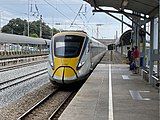KTM ETS
The KTM ETS, commercially known as ETS (Electric Train Service), is an inter-city higher-speed rail service in Malaysia operated by Keretapi Tanah Melayu (KTM). The KTM ETS is the second electric train service to be operated by the Malaysian railway company after KTM Komuter, and the second inter-city rail service after KTM Intercity.
Having begun operations in 2010, the ETS is the fastest metre-gauge train service in Malaysia and operates along the historical KTM West Coast Line in western Peninsular Malaysia, which has since been electrified and double-tracked. The line runs from the north at Padang Besar, near the border with Thailand, to Gemas in Negeri Sembilan. A southern extension from Gemas to Johor Bahru Sentral, near the border with Singapore, is expected to begin operations in 2025, completing the rail electrification between the northern and southern borders.
The rail service is currently operated by the KTM Intercity Division. It was previously operated by ETS Sendirian Berhad, a fully owned subsidiary of Keretapi Tanah Melayu Berhad.
Train services
[edit]
Routes
[edit]Odd-numbered train numbers denote southbound trains (trains bound for KL Sentral and Gemas). Even-numbered train numbers denote northbound trains (trains bound for Padang Besar, Butterworth, and Ipoh).[4]
| Train number | Route | Service | Stops | Train trips | Class |
|---|---|---|---|---|---|
| EG9022, EG9025, EG9027, EG9028,
EG9032, EG9035, |
KL Sentral–Ipoh | Gold | 12 | 3 | 91 & 93/1 |
| ES9051, ES9052 | Silver | 14 | 1 | ||
| EX9004, EX9009 | Express | 4 | 1 | ||
| EP9272, EP9273, EP9274, EP9275, EP9278, EP9279 | KL Sentral–Padang Besar | Platinum | 15 | 3 | 93/2 |
| EX9206, EX9207 | Express | 9 | 1 | ||
| EP9171, EP9172, EP9173, EP9176, EP9177, EP9178, EP9179, EP9180 | KL Sentral–Butterworth | Platinum | 12 | 4 | |
| EX9104, EX9107 | Express | 6 | 1 | ||
| EG9420, EG9425 | Padang Besar–Gemas | Gold | 29 | 1 | 93/1 |
| EG9321, EG9322 | Butterworth–Gemas | Gold | 24 | 1 |
The ETS covers the section of the West Coast Main Line between Padang Besar near the Malaysia-Thailand border and Gemas near the border between Negeri Sembilan and Johor, including the branch line between Bukit Mertajam Junction and Butterworth. The line from Gemas to Johor Bahru is currently a single track and is being double-tracked and electrified. Most routes originate from KL Sentral, the main railway station of Kuala Lumpur, the capital city of Malaysia.
The ETS operates five routes, namely:
- KL Sentral - Ipoh
- KL Sentral - Butterworth
- KL Sentral - Padang Besar
- Gemas - Padang Besar via KL Sentral and Ipoh
- Gemas - Butterworth via KL Sentral and Ipoh
Currently, there are five return trips on the KL Sentral - Ipoh route, five return trips on the KL Sentral - Butterworth route, four return trips on the KL Sentral - Padang Besar route, and one return trip each on the Gemas - Padang Besar and Gemas - Butterworth routes daily. As of 2020, due to traveling restrictions and efforts to curb the pandemic, there were only two trips per day along the five routes that are currently under operation. As of 2022, all services have resumed with fewer Gold service trains.
On August 1, 2024, KTM introduced ETS Express services, three new limited-stop, express train services on the KL Sentral - Ipoh, KL Sentral - Butterworth, and KL Sentral - Padang Besar routes, replacing former ETS Gold services on these routes. These new services offer faster travel, with trains only stopping at major stations along the West Coast Line. These new services came after the completion of Phase 1 of the Klang Valley Double Track and Electrification (KDVT) Project.[5][6]
Services
[edit]The train services are operated in four categories:
- Express service with fewer limited stops (3 return trips), along with business class coach service
- Platinum service with limited stops (7 return trips), along with business class coach service
- Gold service with selected stops (5 return trips)
- Silver service with stops at all stations (1 return trip)
List of Stations
[edit]Padang Besar - Gemas via Ipoh and KL Sentral
[edit]⇄ = cross-platform interchange
| Code | Name | Image | Parking bays | Interchange/notes |
| PDR | Padang Besar |  |
Available |
Northern terminus. Railway service continue to Hat Yai Junction via SRT. Linkbridge access to the Padang Besar Immigration, Customs, Quarantine and Security (ICQS) Complex. Northern terminus of the KTM Komuter Northern Sector's Padang Besar-Butterworth Line. |
| ARU | Arau Royal Station |  |
Available | ⇄ Padang Besar-Butterworth Line
Serves passengers who are mainly students from Universiti Teknologi MARA (Arau Campus), Universiti Malaysia Perlis and Universiti Utara Malaysia |
| ABT | Anak Bukit |  |
Available | ⇄ Padang Besar-Butterworth Line |
| ALS | Alor Setar |  |
Available | ⇄ Padang Besar-Butterworth Line |
| GRN | Gurun |  |
Available | ⇄ Padang Besar-Butterworth Line |
| SPT | Sungai Petani |  |
Available | ⇄ Padang Besar-Butterworth Line |
| TGL | Tasek Gelugor | Available | ⇄ Padang Besar-Butterworth Line | |
| NTB | Nibong Tebal | Available | ⇄ Butterworth-Ipoh Line | |
| PBT | Parit Buntar |  |
Available | ⇄ Butterworth-Ipoh Line |
| BGS | Bagan Serai |  |
Available | ⇄ Butterworth-Ipoh Line |
| TPG | Taiping |  |
Available | ⇄ Butterworth-Ipoh Line |
| PRG | Padang Rengas |  |
Available | ⇄ Butterworth-Ipoh Line |
| KKS | Kuala Kangsar |  |
Available | ⇄ Butterworth-Ipoh Line |
| SGS | Sungai Siput |  |
Available | ⇄ Butterworth-Ipoh Line |
| IPH | Ipoh |  |
Southern terminus of the KTM Komuter Northern Sector's Butterworth-Ipoh Line. | |
| BTG | Batu Gajah |  |
Available |
Served as the ETS depot, together with the CRRC rolling stock centre. |
| KMR | Kampar |  |
Available |
Serving passengers who are mainly students of Universiti Tunku Abdul Rahman (UTAR) Kampar campus. |
| TPH | Tapah Road | Available | ||
| SUI | Sungkai | 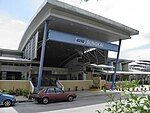 |
Available | |
| SLR | Slim River |  |
Available | |
| KA15 | Tanjung Malim |  |
Available |
Northern terminus of the KTM Komuter Tanjung Malim-Port Klang Line. Serving passengers who are mainly students of the Sultan Idris Education University (UPSI). |
| KA14 | Kuala Kubu Bharu |  |
Available | ⇄ Tanjung Malim-Port Klang Line |
| KA12 | Batang Kali |  |
Available | ⇄ Tanjung Malim-Port Klang Line |
| KA10 | Rawang |  |
Available | ⇄ Tanjung Malim-Port Klang Line |
| KA08 | Sungai Buloh |  |
Available, elevated |
Connecting station to PY04 MRT Putrajaya Line. |
| KA07 | Kepong Sentral | 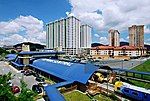 |
Available |
Connecting station to PY08 Sri Damansara Timur on the MRT Putrajaya Line. |
| KA02 | Kuala Lumpur |  |
Available |
Connecting station to KJ14 KG16 Pasar Seni on the LRT Kelana Jaya Line and MRT Kajang Line via a linkbridge. ⇄ Batu Caves-Pulau Sebang Line & Tanjung Malim-Port Klang Line |
| KA01 | KL Sentral |  |
Available, elevated |
Connecting station, without paid-area integration, to:
⇄ Batu Caves-Pulau Sebang Line, Tanjung Malim-Port Klang Line & KL Sentral–Terminal Skypark Line |
| KB04 | Bandar Tasik Selatan |  |
Available, elevated |
Connecting station to SP15 KT2 LRT Sri Petaling Line and ERL KLIA Transit. Exit to Terminal Bersepadu Selatan (TBS) Bus Hub. |
| KB06 | Kajang |  |
Available, elevated |
Connecting station to KG35 MRT Kajang Line. Proposed connecting station to Putrajaya Monorail. |
| KB13 | Seremban |  |
Available | ⇄ Batu Caves-Pulau Sebang Line |
| KB17 | Pulau Sebang/Tampin |  |
Available |
Southern terminus of the KTM Komuter Batu Caves-Pulau Sebang Line. |
| BML | Batang Melaka |  |
Available | |
| GMS | Gemas |  |
Available |
Southern terminus. Railway services continue to Johor Bahru Sentral and Tumpat via KTM Intercity. |
⇄ = cross-platform interchange
| Code | Name | Image | Parking bays | Interchange/notes |
| BTW | Butterworth |  |
Available |
Northern terminus. Connected to Penang Sentral and the Penang Ferry terminal. Terminus for the KTM Komuter Northern Sector Butterworth-Ipoh and Padang Besar-Butterworth Lines. |
| BMT | Bukit Mertajam |  |
Available | ⇄ Padang Besar-Butterworth Line & Butterworth-Ipoh Line |
| continue towards south via Nibong Tebal | ||||
Ridership
[edit]| KTM ETS Ridership[2][7][3][8] | |||
|---|---|---|---|
| Year | Ridership | Revenue (MYR) | Remarks |
| 2024 | 4,134,719 | N/A | |
| 2023 | 4,115,242 | N/A | |
| 2022 | 3,338,531 | N/A | |
| 2021 | 634,334 | N/A | Travel restrictions due to COVID-19 pandemic, services reduced |
| 2020 | 951,100 | N/A | Travel restrictions due to COVID-19 pandemic, services reduced |
| 2019 | 3,902,000 | N/A | |
| 2018 | 3,932,000 | N/A | |
| 2017 | 4,148,000 | 174,433,140 | Highest on record |
| 2016 | 3,565,000 | 145,521,561 | |
| 2015 | 2,059,000 | 60,314,988 | |
| 2014 | 1,693,000 | 44,328,039 | |
| 2013 | 1,563,000 | 40,621,860 | |
| 2012 | 1,180,000 | 31,885,949 | |
| 2011 | 913,000 | 24,313,451 | |
| 2010 | 215,000 | 5,569,532 | Operations began in August |
History
[edit]First phase
[edit]
The service was introduced by Keretapi Tanah Melayu (KTM) on 12 August 2010 between Ipoh and Seremban following the completion of the electrification and double-tracking of the Rawang to Ipoh stretch of the West Coast Line. Its inaugural run was celebrated with an opening ceremony at Kuala Lumpur railway station. Initially, services stretched southwards to Seremban, but the KL Sentral-Seremban sector was taken out of service in October 2012.[9] At launch, there were three service types—Platinum, Gold, and Silver. On the fastest Platinum service, the trip was covered in two hours, one hour faster than by car. Gold and Silver services had more stops, hence taking up to 2 hours and 30 minutes. The route was served solely by 5 Class 91 electric trains.
Second phase
[edit]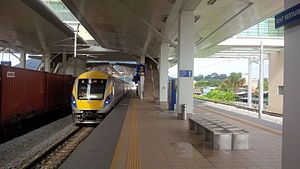
The service was extended from Ipoh to Padang Besar via Butterworth, the mainland town opposite George Town, with the introduction of the ETS Transit on 10 July 2015, with stops at 24 stations. At the inception of service, only one train service in both directions was introduced. This service was named the ETS Transit.
On the following day, 11 July 2015, a new service called the ETS Ekspres between KL Sentral and Padang Besar, via Butterworth was introduced, which only stops at 15 stations. Again, only one service for both directions was introduced.[10] Subsequently, on 1 September 2015, an additional service between KL Sentral and Butterworth was introduced.[11] New rolling stock, the Class 93 trains, were introduced in conjunction with the extended service.
Third phase
[edit]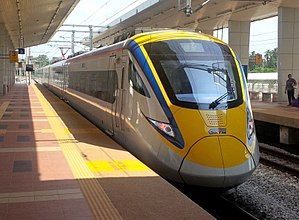
On 10 October 2015, the ETS service was extended southwards from KL Sentral to Gemas with the introduction of a new service between Padang Besar and Gemas.[12] The extension of the KTM ETS service to Gemas utilizes the electrified double-track between Seremban and Gemas which was completed in 2014. This extension of service also saw the ETS service returning to Seremban after being discontinued in 2012.
On the same date, 10 October 2015, a new service was launched between Butterworth and Padang Besar in addition to existing services. However, this service was subsequently reduced in frequency and ultimately terminated with the introduction of the new KTM Komuter Northern Sector.[13]
There were constant revisions of timetables and services as more trains became available, with more train services being added for each of the route segments. The Platinum, Gold, and Silver services were also reintroduced while the terms "ETS Ekspres" and "ETS Transit" were no longer used.
Rolling stock
[edit]| Class | Image | Cars per Set | In service | On order | Manufacturer |
|---|---|---|---|---|---|
| KTM Class 91 | 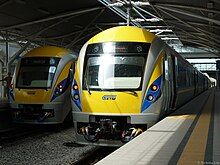
|
6 | 4 | - | Hyundai Rotem |
| KTM Class 93 | 
|
6 | 19 | 0 | CSR Zhuzhou |
First Generation
[edit]Five KTM Class 91 train sets, each comprising six cars, were purchased by KTM for $67 million (USD). The train sets were designed by the Marubeni Corporation and jointly built by Hyundai Rotem of South Korea and Mitsubishi Electric of Japan.[14] The maximum operational speed of the ETS fleet is 140 km/h (87 mph), but the trains are designed to travel up to 160 km/h (99 mph).[15] The total length of each train set is 138 meters, and it weighs 231.8 tons. Each carriage is 22.95 meters long, 2.75 meters wide, and 4 meters high.[16] Each train set has a passenger seating capacity of 350 and includes on-board facilities such as toilets, a buffet car, power sockets for every two seats, and two LED televisions per car.
Second Generation
[edit]
Nineteen sets of KTM Class 93 trains were ordered in two batches to expand the fleet as the electrified network expanded. All 19 trains have been in service since October 2019.
The rolling stock was initially intended to be operational for the launch of the ETS Express service between KL Sentral and Padang Besar and the ETS Transit service between Ipoh and Padang Besar. However, issues during the testing and commissioning phase of the train sets led to the Malaysian land public transport authority, SPAD, not approving the trains for use in time for the launch of the two services on 10 July 2015 and 11 July 2015.[17] Consequently, two KTM Class 91 train sets were used temporarily—one for the ETS Express and the other for the ETS Transit—allowing for just one trip in each direction for both services.
The first four KTM Class 93 sets went into service on 10 October 2015, and all sets from the first batch have since entered service.
The second batch of KTM Class 93 trains differs slightly from the first, featuring a redesigned livery and a business class coach, a first for ETS services. These coaches, named Class 93/2, started operations with the launch of the new ETS Business Class in October 2019.
Third Generation
[edit]A batch of 10 Class 93/3 trains was tendered in May 2020 in light of the completion of the Gemas-JB Sentral Electrified Double Track Project (EDTP).[18] The tender was awarded to CRRC Zhuzhou Locomotive, with 8 out of 10 sets being manufactured in Malaysia. The first set was completed on 8 June 2024.
Longest and fastest metre-gauge trains in the world
[edit]The ETS trains currently travel up to 140 km/h (87 mph) on the electrified metre gauge rail line. Due to the gauge, the service can be considered a higher-speed rail (HrSR) limited-express service.
Similar services operate on 1,067 mm (3 ft 6 in) narrow gauge railways in other parts of the world: the Kuroshio, Shirasagi, Sonic, and Thunderbird limited express services in Japan, the Taroko and Puyuma Express in Taiwan, and the Electric and Diesel Tilt Train services in Australia.
The only similar metre gauge rail service currently operating is the Renfe Feve on Cercanías Asturias and Euskotren Trena, specifically the Bilbao-Donostia inter-city rail line in northern Spain. This type of inter-state train service is quite similar to the KTM Komuter Northern Sector regional commuter services.
Thus, the ETS stands as one of the fastest 1,000 mm (3 ft 3+3⁄8 in) metre gauge train services in the world, reaching a maximum speed of 140 km/h (87 mph).
On-board service
[edit]
Standard Class
[edit]The seats on the Class 93 trains are arranged in a 2+2 configuration, with each seat featuring a tray table and a power outlet. Cluster seats with fixed tables are available on the Class 93. The seats can be easily converted for wheelchair use if necessary. Each coach is equipped with LCD TV screens for entertainment, and toilets are available in every coach. The latest Class 93/2 trains include changing tables for infants. For Muslim passengers, a prayer room is available on every train. There is also a bistro coach that sells drinks, light snacks, and microwaved meals. This class is available on all trains and is the only class available on older trains such as the Class 91 and Class 93/1.
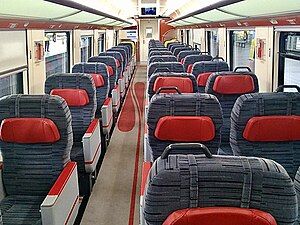
Business Class
[edit]The Business Class service offers an upgrade from the Standard Class, providing several enhanced features not available in Standard Class. The seats are arranged in a 2+1 configuration, offering greater width and the ability to recline up to 45 degrees. They can also be rotated to face any direction. Each seat is equipped with both a power outlet and a USB port, as well as an on-demand video screen for in-train entertainment. Complimentary Wi-Fi is available for Business Class passengers. Each coach is staffed with a steward or stewardess who can be summoned from the seats. On-board dining is included in the fare, and passengers are provided with an amenity kit. This service is exclusively available on newer trains such as the Class 93/2 trains and the future Class 94 trains.
Extension
[edit]Gemas – Johor Bahru Sentral
[edit]The MYR 8 billion contract was expected to be tendered by the end of 2008, pending a mid-term review of the Ninth Malaysia Plan. The project included building over 200 km (120 mi) of parallel railway tracks, including stations, depots, halts, yards, and bridges, as well as systems such as electrification, signaling, and communications.[19] This included a realignment of the Pulau Sebang/Tampin - Gemas section.
In May 2009, Global Rail Sdn Bhd, a relatively small contractor, and its Chinese partner, China Infraglobe, submitted a proposal to the Government to build and upgrade tracks from Gemas to Johor Bahru at a cost of MYR 5 billion. The project was proposed on a private finance initiative basis, and the plan submitted to the Ministry of Finance in June 2009 was conditional upon signing over mineral rights in the state of Johor.[20]
On 29 January 2011, then Transport Minister Datuk Seri Kong Cho Ha stated that the Gemas - Johor Bahru double-tracking and electrification project was expected to start that year. He added that the Government hoped to appoint the contractor for the project within the year and that Malaysia was still in discussions with China Railway Construction, though nothing was confirmed. Kong noted that two consultants, a design consultant and an independent checker, had been appointed to monitor the project. The construction of 192 km (119 mi) of tracks, estimated to cost between MYR 6 billion and MYR 7 billion, was projected to take three years.[21]
On 27 October 2015, the public display exercise, required for all new railway developments under Section 84 of Malaysia's Land Public Transport Act 2010, for the Gemas - Johor Bahru Electrification and Double Tracking Project began and ran until 27 January 2016. The Chinese company CRCC was awarded the contract to carry out the project. Construction began in January 2018.[22] The project was expected to be completed by mid-2023,[23] but on 23 March 2023, it was announced that the extension would be delayed until mid-2025.[24]
The length of the line to be electrified and double-tracked is 192 km (119 mi) between Chainage 563.040 at Gemas and Chainage 754.180 at JB Sentral. The project includes the construction of 11 stations at Segamat, Genuang, Labis, Bekok, Paloh, Kluang, Mengkibol, Rengam, Layang-Layang, Kulai, and Kempas Baru, with three future stations planned at Tenang, Chamek, and Senai. The upgraded line is expected to accommodate at least 22 daily services involving ETS, KTM Intercity, shuttle train services, and KTM Komuter.
The documents displayed also stated that the electrification for this stretch would have the same specifications as the Seremban-Gemas stretch, with 25 kV AC 50 Hz single-phase supplied via an overhead catenary system. Train operations for this stretch will be integrated with the Train Control Centers at KL Sentral and Gemas. The designed maximum speed for the tracks is 160 km/h (99 mph).
Gallery
[edit]-
Class 93 entering Kajang
-
Class 93 entering Pulau Sebang/Tampin
-
Class 93 at KL Sentral
-
Class 93 passing Kampar, Perak heading North to Batu Gajah
-
Class 91 and 93 at Batu Gajah Railway Depot
See also
[edit]References
[edit]- ^ "PERKHIDMATAN ETS" (PDF) (in Malay and English). KTMB. Retrieved 20 February 2022.
- ^ a b "Statistic for Rail Transport" (in Malay and English). Ministry of Transport, Malaysia. Archived from the original on 7 July 2019. Retrieved 13 December 2018.
- ^ a b "Statistics of Rail Transport". Ministry of Transport Malaysia. 13 February 2023. Archived from the original on 13 February 2023. Retrieved 13 February 2023.
- ^ "KTMB Train Schedule". KTMB. Retrieved 2024-06-19.
- ^ Borhan, Najihah (2024-05-29). "KTMB to introduce new ETS schedule and six more express services | New Straits Times". NST Online. Retrieved 2024-06-19.
- ^ Low, Celine (2024-05-30). "KTMB Announces 6 New ETS Express Services Starting In August". SAYS. Retrieved 2024-06-19.
- ^ "Transport Statistics Malaysia 2017" (PDF) (in Malay and English). Ministry of Transport, Malaysia. Retrieved 2018-09-26.
- ^ Harun, Hana Naz; Sallehuddin, Qistina (2024-03-07). "Loke: 10 new electric trains to start next year to meet demand". NST Online. Retrieved 2024-04-15.
- ^ "Recent scheduling ETS Services". KTM Intercity. Archived from the original on 26 November 2012. Retrieved 18 November 2012.
- ^ "KL-Padang Besar electric train starts run today". The Star. 10 July 2015. Retrieved 19 July 2015.
- ^ "Kenyataan Media:Penstrukturan Jadual Waktu Tren Intercity dan ETS Bermula 1 September 2015 (Restructuring of the Timetable for Intercity dan ETS Trains beginning 1 September 2015)" (PDF). KTM Berhad. Archived from the original (PDF) on 5 September 2015. Retrieved 16 October 2015.
- ^ "Kenyataan Media:Penstrukturan Jadual Waktu Tren Intercity dan ETS Bermula 10 Oktober 2015 (Restructuring of the Timetable for Intercity and ETS Trains beginning 10 October 2015)" (PDF). KTM Berhad. Archived from the original (PDF) on 6 November 2015. Retrieved 16 October 2015.
- ^ "KTM BERHAD". ktmb.com.my. Archived from the original on 2017-09-10. Retrieved 2017-09-10.
- ^ "Marubeni Gets $67 Million Malaysia Train-Car Order, Nikkei Says". Bloomberg. Bloomberg. 26 October 2008.
- ^ "Electric trains to reduce travel time". The Star. Central. 24 August 2010.
- ^ "Electric Train Set". Malaya Railway.
- ^ Meng Yew Choong (19 July 2015). "Manufacturer working hard to solve issues with new ETS sets before official handover". The Star. Kuala Lumpur. Retrieved 20 July 2015.
- ^ "Gemas-Johor Bahru Electrified Double Track Project – BRI Monitor". Retrieved 2022-04-22.
- ^ Sharen Kaur (16 June 2008). "Tenders may be called". Business Times. Archived from the original on 18 June 2008. Retrieved 16 June 2008.
- ^ Sharen Kaur (12 May 2009). "RM5b rail project on drawing board". Business Times. Archived from the original on 15 May 2009.
- ^ "JB-Gemas railway project expected to begin this year". The Star. 29 January 2011. Archived from the original on 28 June 2011.
- ^ "KTMB: Construction of Gemas-JB Sentral ETS twin tracks begins this month". 21 January 2018.
- ^ Shah, Mohamed Farhaan (16 November 2022). "Gemas-JB ETS almost ready to run". The Star. Retrieved 13 February 2023.
- ^ "Loke: Gemas-JB ETS delayed till mid-2025". www.youtube.com. The Star. 2023-03-28. Retrieved 2023-06-24.



